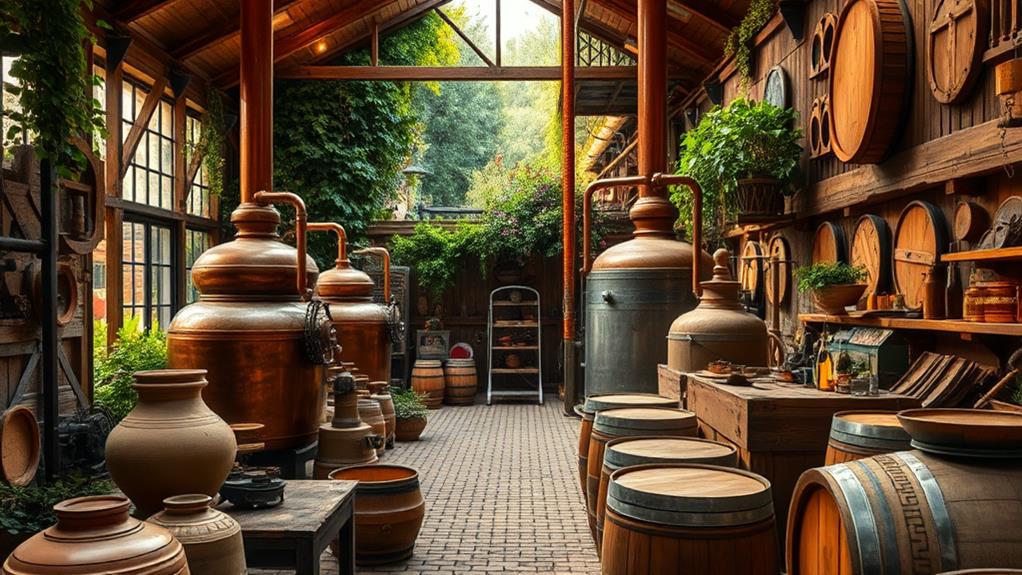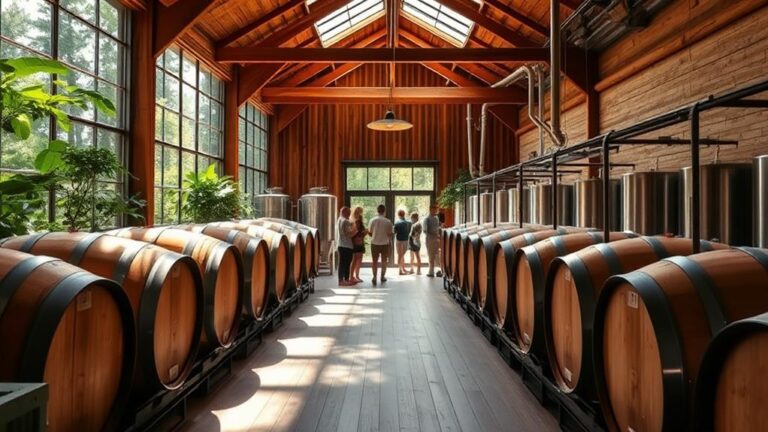Rediscovered Ancient Brews: Time-Honored Techniques for Modern Brewers
Explore the rich history of ancient brews, where archaeology and brewing intersect to reveal the cultural significance of beer in civilizations like Sumeria, Greece, and Rome. Learn about ancient brewing techniques, such as steeping, boiling, and fermentation, and how local ingredients like barley, honey, and spices created distinct flavor profiles. Discover unique ingredients like juniper branches and wormwood, used in traditional Viking and monastic beers. Understand how fermentation methods, like spontaneous fermentation, can inspire bold flavors and aromas. By uncovering ancient techniques, you'll gain insights into the past and spark new ideas for modern brewing innovations that await your discovery.
Key Takeaways
- Ancient brews served as vital social connectors, facilitating gatherings and community stability in civilizations like Sumeria and Ancient Greece.
- Local ingredients and simple methods like steeping and boiling were employed to extract flavors in ancient brewing techniques.
- Excavations and chemical analysis of pottery residues reveal ingredients and contribute to understanding historical brewing practices.
- Spontaneous fermentation with wild yeast resulted in distinctive flavors, while controlled variables aid in replicating ancient brews.
- Modern brewers revive ancient recipes using modern techniques, encouraging innovation and highlighting creativity in historical brewing traditions.
Historical Beer Revival
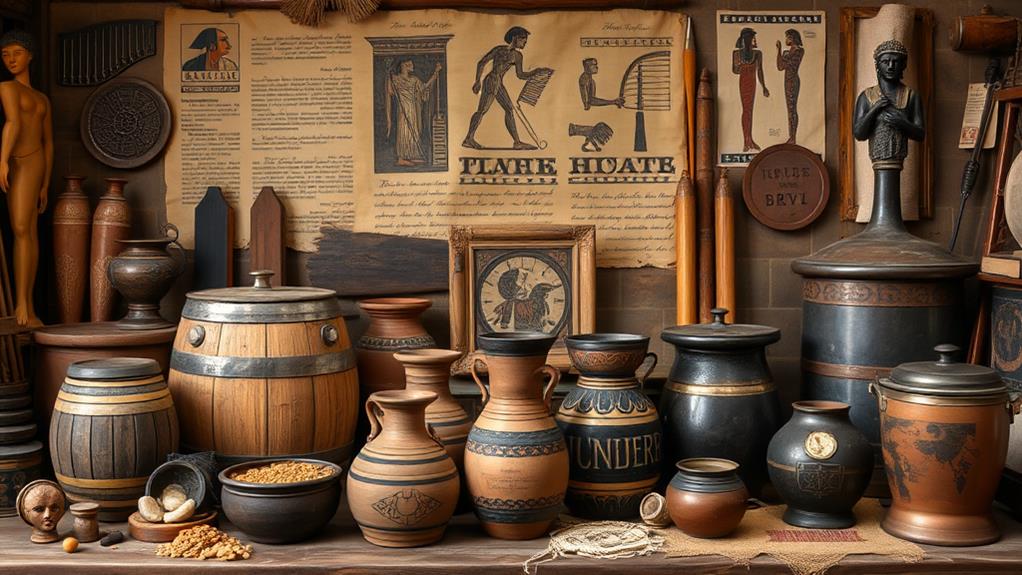
Step into the world of historical beer revival, where the intersection of archaeology and brewing is redefining the way we think about ancient civilizations. This revival sheds light on the cultural significance of beer in ancient societies, from the Sumerians revering it as a divine gift to its everyday consumption.
Beer archaeology has led to the discovery of ancient ales made with ingredients like rice, honey, and fruit. Modern brewers are now experimenting with unique flavor pairings that highlight the complexity of these ancient brews, including herb and spice beer pairings.
Travis Rupp, a pioneer in this field, combines historical knowledge with modern brewing practices to recreate unique flavors at Avery Brewing. By experimenting with ancient recipes, you can reveal the secrets of historical brews and appreciate the sophistication of ancient cultures.
Ancient Brewing Techniques
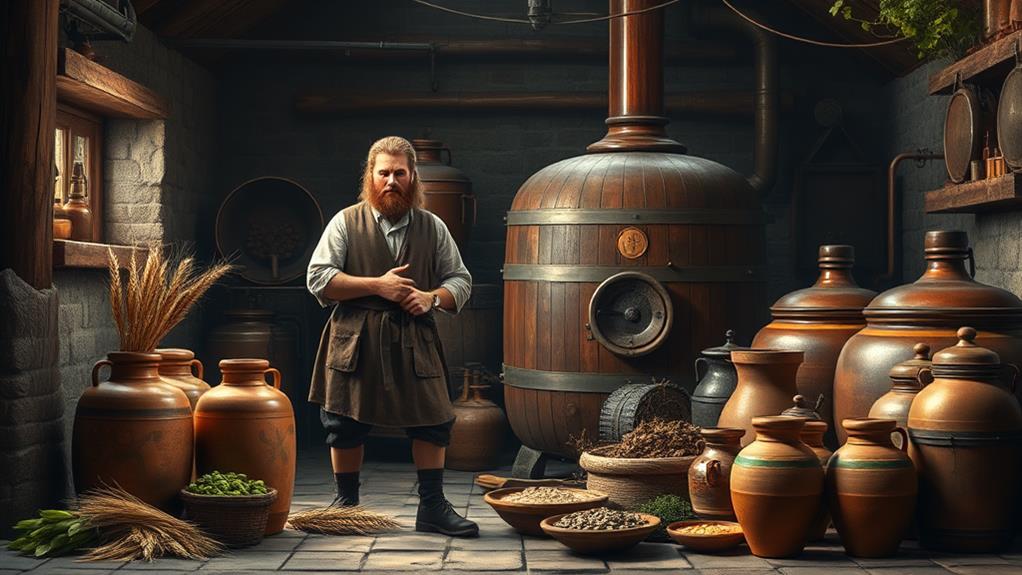
As you experiment with unique flavor pairings and ingredients, you're likely wondering how ancient brewers actually made their beers. Delving into archaeological evidence reveals that ancient brewing techniques varied greatly across civilizations.
Ancient civilizations, such as the Sumerians and Egyptians, used local ingredients like barley, honey, and fruit to create distinct flavor profiles. Modern brewers can draw inspiration from these ancient practices, particularly in how they utilized locally sourced fruits to enhance their brews, allowing for delightful fruit beer pairings that elevate meals.
Archaeochemical analysis has allowed modern brewers to recreate historical flavors with greater accuracy. Ancient brewing techniques often involved simple methods, such as steeping and boiling, to extract flavors from ingredients.
Fermentation Methods
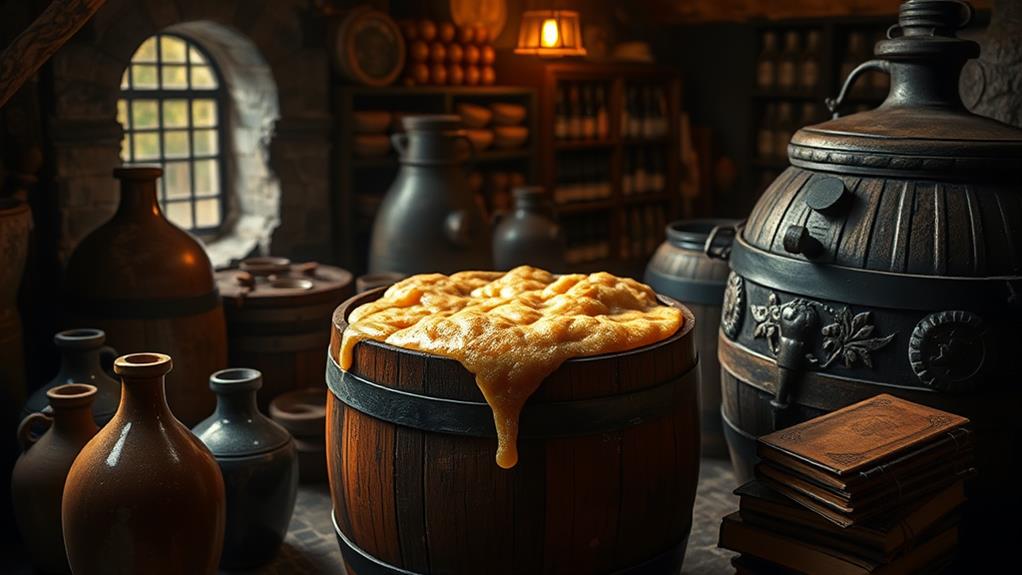
Thousands of years ago, ancient brewers relied on a fundamental process to create their ales and other alcoholic beverages: fermentation.
Fermentation is a biochemical process where yeast converts sugars into alcohol and carbon dioxide, a method that has been utilized for thousands of years.
In modern times, brewers can draw inspiration from ancient practices to create unique flavors, much like the pairing of lambic beer with food enhances the overall experience.
You can replicate ancient fermentation methods by understanding the techniques used by ancient brewers.
Archaeochemical analysis has revealed that ancient brews often utilized spontaneous fermentation, where wild yeast from the environment would inoculate the brew, resulting in unique flavors and characteristics.
By using ingredients and methods that align with those found in archaeological studies, you can create brewing methods that are deeply rooted in history and tradition.
This approach allows you to tap into the cultural practices associated with brewing in ancient societies.
Unique Ingredients and Spices
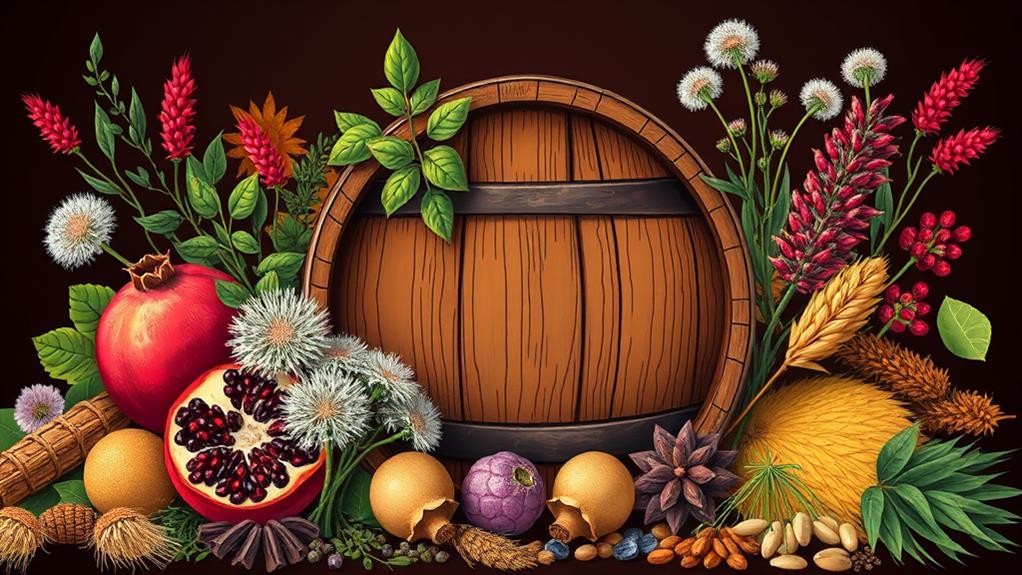
By embracing the techniques of ancient brewers, you're not just replicating a process – you're also revealing a world of unique flavors and ingredients. Ancient fermented beverages often featured ingredients like honey, fruits, and spices, showcasing the diversity of ancient brewing practices. Consider the following ingredients and their uses:
| Unique Ingredient | Use in Ancient Brews |
|---|---|
| Pomegranate juice | Added to Beersheba beer for flavor |
| Juniper branches | Used in traditional Viking beer |
| Cacao | Incorporated in Theobroma for a rich flavor |
| Wormwood | Used in monastic traditions like Benedictus |
Reviving Lost Cultures

Fermentation's rich cultural heritage is a treasure trove waiting to be unearthed, and you're the archaeologist tasked with unearthing its secrets.
Ancient breweries, like the one discovered at Abydos, Egypt, reveal the advanced organization and technology of ancient societies in beer production. You're not only brewing beer, but reviving lost cultures and their traditions.
By exploring ancient beverage recipes, you're fostering a deeper appreciation for the historical and communal aspects of fermentation throughout human history.
For example, the Sumerians revered beer, attributing its creation to the goddess Ninkasi, highlighting the cultural significance of brewing in ancient societies.
Reviving these ancient brews connects you to a rich beer history, allowing you to tap into the creativity and ingenuity of our ancestors.
Archaeological Beer Findings
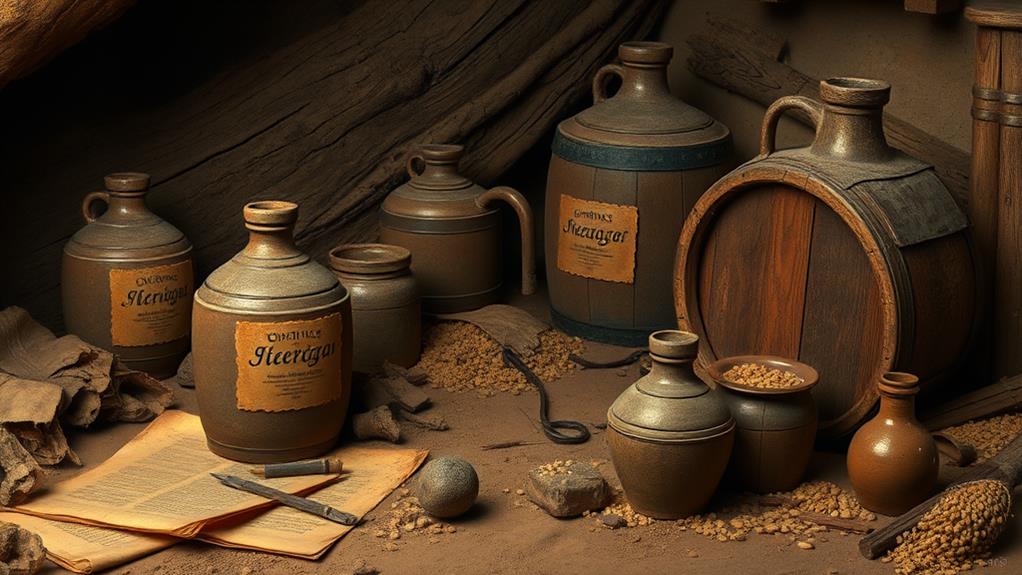
Uncover the latest discoveries in the domain of archaeological beer findings, and you'll find yourself staring into the face of a remarkably advanced ancient brewing industry.
Excavations at archaeological sites like Abydos in Egypt have revealed massive breweries, challenging perceptions of ancient technological capabilities.
Similarly, discoveries at Akrotiri have shown that ancient Greeks brewed beer, with vases containing spent grain indicating a rich brewing culture.
Chemical analysis of residues in ancient pottery has also uncovered ingredients like barley, honey, and spices in ancient brews.
Experimental Brewing Process
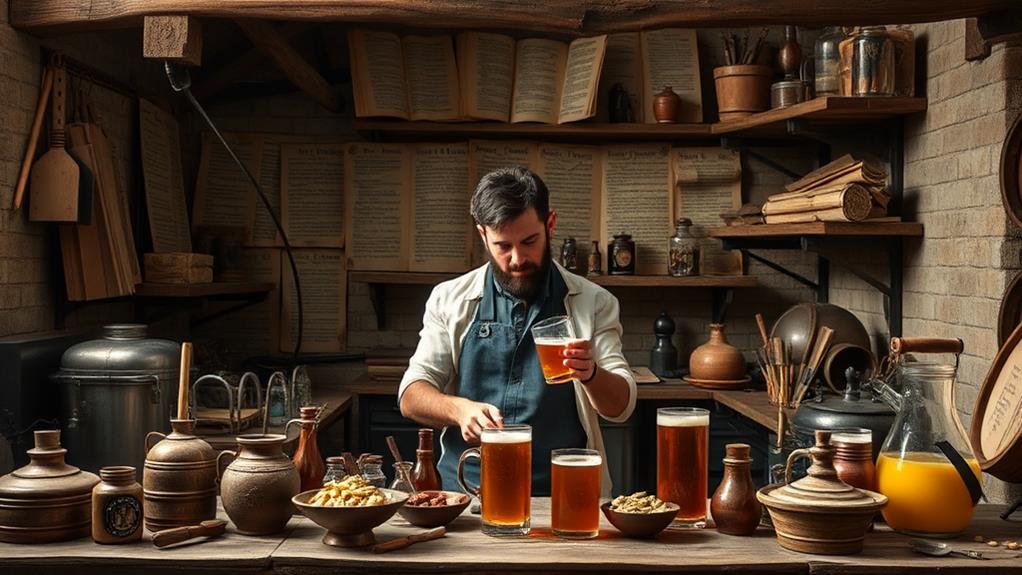
To successfully replicate ancient brews, experimental brewers must thoroughly understand the techniques used by their predecessors. This involves studying the methods used to create ancient ales and adapting them to modern brewing contexts.
Ethnographic research plays an essential role in this process, as insights from local communities can inform the adaptation of ancient recipes. By combining historical techniques with advanced scientific methods, such as mass spectrometry and liquid chromatography, brewers can analyze residues from ancient artifacts and improve the accuracy of their recipes.
This process requires careful control and documentation of variables such as water chemistry, environmental conditions, and yeast strains. With patience and attention to detail, you can reveal the secrets of ancient brews and create unique, historically-inspired beers.
Ancient Beer Recipes
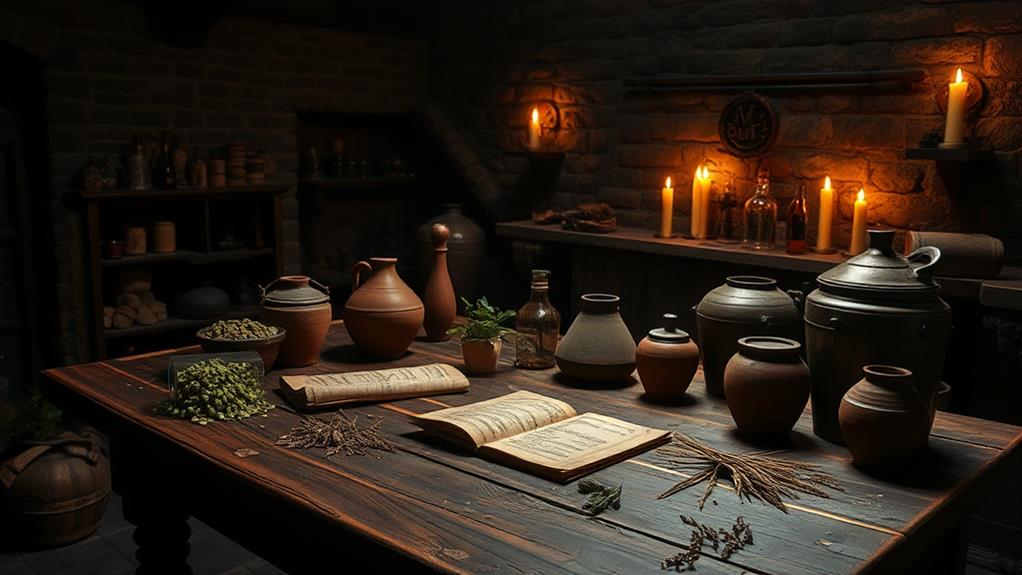
Beyond the reach of conventional brewing methods lies the world of ancient beer recipes, where unique ingredients and methods converge to create distinctive flavors.
Ancient ales and brews, with their bold flavors and aromas, give you the freedom to experiment with new ingredients and brewing techniques. According to a scientific director, these recipes showcase the resourcefulness of ancient brewers, who used local ingredients to create diverse beers.
Consider trying your hand at the Viking beer recipe, which incorporates juniper branches for a banana aroma, or the Benedictus recipe, which combines wormwood and lavender for a unique flavor profile.
Cultural Significance of Brews
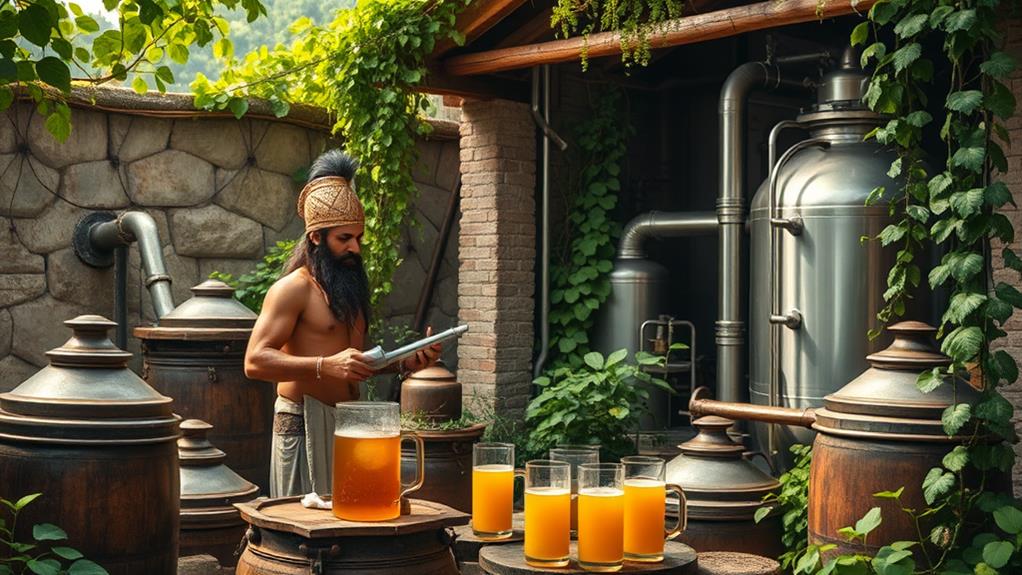
Ancient brews played a vital role in the social fabric of various civilizations, serving as more than just a drink to quench thirst. They facilitated social gatherings, reinforced community stability, and even held divine associations.
| Civilization | Cultural Significance | Brewing Practice |
|---|---|---|
| Ancient Greece | Facilitated discourse and alliance-building | Fermented drinks central to social and political life |
| Ancient Rome | Reinforced social cohesion and community stability | Shared drinking practices during banquets |
| Sumerians | Attributed beer creation to the goddess Ninkasi | Revered beer as a divine gift |
| Ancient China | Earliest evidence of fermentation found in Jiahu | Fermentation played a vital role in medicinal practices |
These ancient ales not only brought people together but also played a significant role in shaping their cultural identity. By understanding the cultural significance of ancient brews, you can appreciate the rich history behind fermentation and its timeless human connection.
Modern Applications of Tradition
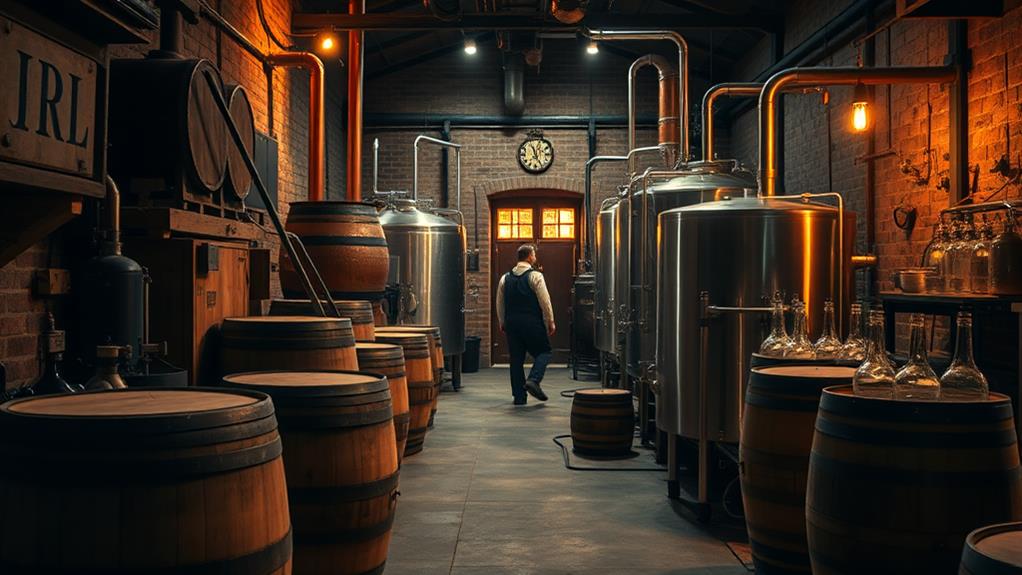
As modern brewers tap into the rich history of their craft, they're finding innovative ways to revive and reimagine ancient recipes. By combining archaeochemistry techniques like mass spectrometry with traditional brewing methods, you can create unique beverages that pay homage to the past.
Consider experimenting with ancient brews like Peruvian chicha or Viking beer, which incorporate traditional ingredients and methods to connect contemporary consumers with historical drinking practices.
Look to breweries like Dogfish Head for inspiration – they've collaborated with experts like Patrick E. McGovern to recreate ancient recipes.
Frequently Asked Questions
Who Were Typically the Brewers of Beer in Ancient Sumeria?
You're looking at the past, and it's clear that in ancient Sumeria, women typically took charge of brewing beer. They were often referred to as "beer maids" or "brewsters," and played an essential role.
What Did Medieval Brewers Do?
You're diving into the world of medieval brews. Medieval brewers typically mashed grains in hot water to extract sugars, then boiled the wort with hops and fermented it with yeast, often in wooden barrels, creating unique regional flavors.
When Did Brewers Start Using Hops?
You're about to tap into history – 80% of medieval beers spoiled due to lack of preservatives. You'll find that brewers started using hops around the 9th century in Europe, revolutionizing beer production forever.
